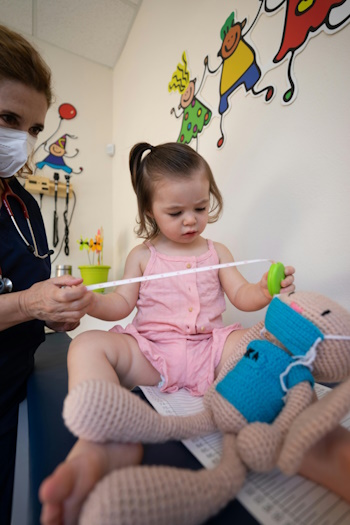
Welcoming a new baby into the world is an exciting and sometimes overwhelming experience.
As a new parent, you want to ensure that your newborn receives the best possible care right from the start.
One of the most important steps in your baby’s healthcare journey is establishing a relationship with a pediatrician.
Your pediatrician will be your partner in ensuring your baby’s health and well-being.
To make the most of your first pediatric visit, it’s essential to come prepared with questions.
Here are the top 10 questions to ask your pediatrician for your newborn:
1. What Should I Know About Newborn Feeding Patterns?
Feeding your newborn is one of the primary concerns of a new parent.
It’s important to understand your baby’s feeding cues, how often to feed, and how to recognize signs of hunger or fullness.
Your pediatrician can guide breastfeeding, formula feeding, or a combination of both.
They can also offer advice on proper latch techniques, feeding positions, and how to know if your baby is getting enough milk.
Additional Tips:
- Discuss the benefits of breastfeeding and how to establish a good breastfeeding routine.
- Ask about techniques to manage common breastfeeding challenges such as engorgement, sore nipples, and low milk supply.
- Inquire about formula feeding, including how to choose the right formula and how to prepare and store it safely.
2. How Can I Ensure My Baby Is Sleeping Safely?
Safe sleep practices are crucial to reduce the risk of Sudden Infant Death Syndrome (SIDS) and other sleep-related accidents.
Ask your pediatrician about the recommended sleep environment for your baby, including the safest sleeping position, whether to use a crib or bassinet and the importance of avoiding soft bedding and sleep positioners.
Additional Tips:
- Discuss strategies for establishing a bedtime routine to help your baby sleep more soundly.
- Ask about safe sleep practices for naps, including where and how often your baby should nap during the day.
- Inquire about techniques for soothing your baby to sleep without relying on unsafe sleep props.
3. What Vaccinations Will My Newborn Need?
Vaccinations are essential for protecting your baby from serious and potentially life-threatening diseases.
Your pediatrician will discuss the recommended vaccination schedule, including when each vaccine should be administered and the potential side effects.
They can also address any concerns about vaccine safety and efficacy.
Additional Tips:
- Inquire about the importance of herd immunity and how vaccinating your baby protects vulnerable members of the community.
- Ask about any recent updates or changes to the recommended vaccination schedule.
- Discuss strategies for managing common vaccine-related concerns such as mild fever or soreness at the injection site.
4. How Do I Care for My Baby’s Umbilical Cord Stump?
In the first few weeks of life, your baby’s umbilical cord stump will gradually dry up and fall off.
Proper care is important to prevent infection.
Your pediatrician can provide instructions on how to clean and care for the umbilical cord stump until it heals completely.
Additional Tips:
- Ask about signs of infection to watch for, such as redness, swelling, or discharge from the umbilical cord stump.
- Inquire about bathing your baby with the umbilical cord stump still attached and when it’s safe to submerge your baby in water.
- Discuss how to properly clean around the umbilical cord stump during diaper changes to prevent irritation or infection.
5. What Are the Normal Ranges for Newborn Vital Signs?
Monitoring your baby’s vital signs can help you identify signs of illness or distress early on.
Ask your pediatrician about the normal ranges for your baby’s temperature, heart rate, and breathing rate.
They can also teach you how to take your baby’s temperature correctly and when to contact them if you notice any abnormalities.
Additional Tips:
- Inquire about the best method for taking your baby’s temperature, whether it’s through the rectum, armpit, or forehead.
- Discuss the importance of monitoring your baby’s breathing patterns and what to do if you notice any signs of respiratory distress.
- Ask about other vital signs to watch for, such as changes in skin color or responsiveness, and when to seek emergency medical care.
6. How Should I Bathe My Newborn?
Bathing your newborn may seem daunting at first, but with guidance from your pediatrician, you’ll feel more confident.
Ask about the frequency of baths, the use of baby-safe products, and how to properly support your baby during bath time.
Your pediatrician can also provide tips for keeping your baby’s skin clean and healthy.
Additional Tips:
- Inquire about the ideal water temperature for bathing your baby and how to test it to prevent scalding.
- Discuss the use of gentle cleansers and moisturizers suitable for your baby’s delicate skin.
- Ask about techniques for safely handling your slippery newborn during bath time and how to ensure they stay warm and comfortable afterward.
7. What Are Common Newborn Health Concerns I Should Watch For?
As a new parent, worrying about your baby’s health is natural.
Your pediatrician can help alleviate some of these concerns by discussing common newborn health issues such as jaundice, colic, reflux, and diaper rash.
They can explain what symptoms to watch for and when to seek medical attention.
Additional Tips:
- Inquire about techniques for soothing a fussy baby and managing common discomforts such as gas or constipation.
- Discuss strategies for preventing diaper rash and other skin irritations, such as frequent diaper changes and gentle cleansing.
- Ask about signs of dehydration in newborns and how to ensure your baby stays adequately hydrated, especially during hot weather or illness.
8. How Can I Help My Baby Develop Properly?
Babies grow and develop at a rapid pace during the first year of life.
Your pediatrician can offer guidance on age-appropriate developmental milestones and activities to promote your baby’s physical, cognitive, and social development.
They can also address any concerns about your baby’s progress.
Additional Tips:
- Discuss the importance of tummy time for building strength and preventing flat spots on your baby’s head.
- Inquire about age-appropriate toys and activities to encourage sensory exploration and fine motor skills development.
- Ask about techniques for promoting language development through reading, singing, and talking to your baby from an early age.
9. What Should I Do If My Baby Is Sick?
Knowing how to recognize signs of illness in your newborn is essential for prompt medical intervention.
Ask your pediatrician about common signs of illness, when to call for advice, and when to seek emergency care.
They can guide managing minor illnesses at home and when to bring your baby in for evaluation.
Additional Tips:
- Inquire about over-the-counter medications that are safe to use for common infant ailments such as fever, cough, or congestion.
- Discuss strategies for managing symptoms at home, such as using a humidifier or nasal saline drops for congestion relief.
- Ask about warning signs that indicate your baby may need urgent medical attention, such as difficulty breathing, persistent vomiting, or a high fever.
10. How Often Should We Schedule Well-Child Visits?
Regular well-child visits are important for monitoring your baby’s growth, development, and overall health.
Your pediatrician will recommend a schedule for these visits based on your baby’s age and individual needs.
Ask about the frequency of visits and what to expect during each appointment, including developmental screenings, vaccinations, and growth measurements.
Additional Tips:
- Inquire about the importance of well-child visits for tracking your baby’s growth trajectory and identifying potential developmental delays.
- Discuss strategies for preparing your baby for well-child visits, such as bringing a list of questions or concerns and keeping a record of feeding and diapering habits.
- Ask about the availability of telehealth appointments or nurse advice lines for addressing non-urgent concerns between well-child visits.
In addition to these questions, don’t hesitate to raise any other concerns or questions you may have about your baby’s health, development, or care.
Your pediatrician is there to support you every step of the way on your parenting journey. Remember, no question is too small when it comes to the well-being of your child.
This comprehensive guide serves as a roadmap for new parents preparing for their first pediatric visit.
Each section provides valuable information and guidance to help parents navigate the early days of parenthood with confidence.
If you have any further questions or need additional support, don’t hesitate to reach out to your pediatrician or healthcare provider. They are invaluable resources for you and your growing family.
Disclaimer:
The information provided in this article is for educational and informational purposes only. It is not intended as medical advice or a substitute for professional medical care. Always seek the advice of your healthcare provider with any questions or concerns you may have regarding your child’s health or medical condition. The author and publisher of this article do not assume any liability or responsibility for any errors or omissions in the content or any consequences resulting from the use of the information provided.
Affiliate Disclaimer:
This article may contain affiliate links, which means that if you click on one of the product links and make a purchase, we may receive a small commission. This commission helps support the maintenance and development of our website and allows us to continue providing valuable content to our readers. However, please note that we only recommend products or services that we genuinely believe will be of value to our readers. We appreciate your support!
(Sources: American Academy of Pediatrics – Breastfeeding, American Academy of Pediatrics – Safe Sleep, Centers for Disease Control and Prevention – Vaccines for Your Children, Mayo Clinic – Umbilical Cord Care for Newborns, Stanford Children’s Health – Vital Signs in Children, American Academy of Pediatrics – Bathing Your Newborn, MedlinePlus – Newborn Jaundice)

